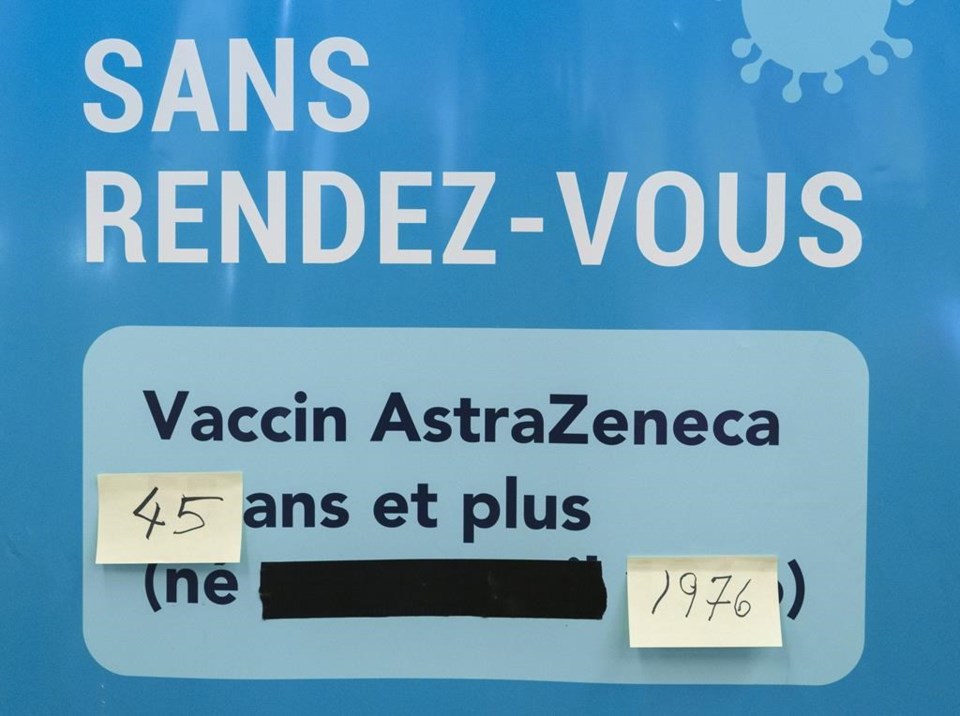MONTREAL — The risk of developing serious blood clots from the Oxford-AstraZeneca vaccine is similar to the chances of being struck by lightning, the chief physician at the McGill University Health Centre said Wednesday.
Dr. Marc Rodger offered the comparison following Tuesday's news that a 54-year-old Quebec woman died April 23 from a blood clot that developed after she got the vaccine.
Rodger said the death of Francine Boyer is "absolutely tragic," but the risk of COVID-19 for people who aren't vaccinated is exponentially higher than for those who are.
"The risk seems to be in the one-in-100,000 range," he said in an interview, about blood clots. "To put that in context, that's similar risk to being struck by lightning at some point in your lifetime."
Almost 11,000 Quebecers have died from COVID-19, Rodger said, while Boyer's death is believed to be the first in Canada potentially linked to a vaccine. The virus, he added, also causes far more blood clots than the vaccine does.
In a statement released late Tuesday, Boyer's family described how her health declined after she and her husband received the AstraZeneca vaccine on April 9. In the days that followed, she began to experience headaches and severe fatigue, the family said.
Boyer went to a hospital before being transferred to the Montreal Neurological Institute as her condition worsened, and died of a cerebral thrombosis. Her husband did not develop side-effects.
An online obituary says Boyer was originally from St-Rémi, Que., south of Montreal, and was a mother and a grandmother.
Her family urged anyone who develops side-effects from the vaccine to seek medical advice using the province's phone help line.
"Ms. Boyer's family would like to encourage people who receive a vaccine to stay alert for symptoms or unusual reactions and to contact Info-Santé (811) if in doubt," the statement read.
Rodger said it's normal for people who have received a vaccine to feel sick afterwards and to experience symptoms such as a fever and headache. Those don't require going to an emergency room, he said.
The symptoms of a rare blood clot are different: they occur later — between four and 20 days after the shot — and are much more dramatic, Rodger explained.
He said signs of a blood clot in the brain include severe headaches, vision changes, speech loss or loss of function in one arm or leg. Chest pain or shortness of breath can be the sign of a pulmonary embolism, while severe pain and swelling can indicate a clot.
Anyone who gets those symptoms should seek medical attention immediately, Rodger said.
Health Canada has authorized the AstraZeneca vaccine for people 18 and up after concluding it is safe and effective despite evidence suggesting it may cause blood clots in rare cases. A national advisory panel has suggested the shot can be offered to those 30 and over if they don't want to wait for a different vaccine.
Quebec is administering the vaccine to people between the ages of 45 and 79, and the province's public health director said Tuesday it will continue that strategy.
Rodger said experts don't yet have a complete picture of which segments of the population are most at risk of clots, although women appear to be more prone than men. He said he still believes declining a vaccine is a riskier proposal for the age groups that are eligible to receive one.
"We are concerned about this complication, but the flip side of not getting vaccinated has a much, much, much higher risk of complication," he said.
Officials in Montreal said Wednesday there were still some doses of AstraZeneca available for those 45 and up who want to make an appointment.
Mylène Drouin, the city's public health director, said the vaccine was being offered on the principle of "informed consent," meaning those who sign up will be made aware of potential risk.
"I think (in terms of) the benefit versus the risk, there is still more benefit to get the vaccine, but everyone has to do their proper reflection," she said.
Meanwhile, the province reported 1,094 new cases of COVID-19 Wednesday and 12 more deaths attributed to the novel coronavirus, including three in the past 24 hours. Hospitalizations dropped by 24, to 643, while the number of people in intensive care dropped by nine, to 161.
The vaccine program has expanded to include pregnant women, who became eligible on Wednesday to book appointments.
Later in the day, Quebec's public health director said the government was studying the possibility of vaccinating children between the ages of 12 and 16 over the summer. Dr. Horacio Arruda told a meeting at the provincial legislature he was following the ongoing studies involving the Pfizer-BioNTech vaccine and said the province could move quickly if the shot is authorized for those under 16.
This report by The Canadian Press was first published April 28, 2021.
Morgan Lowrie, The Canadian Press

